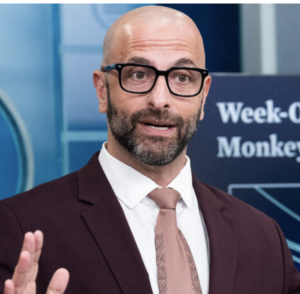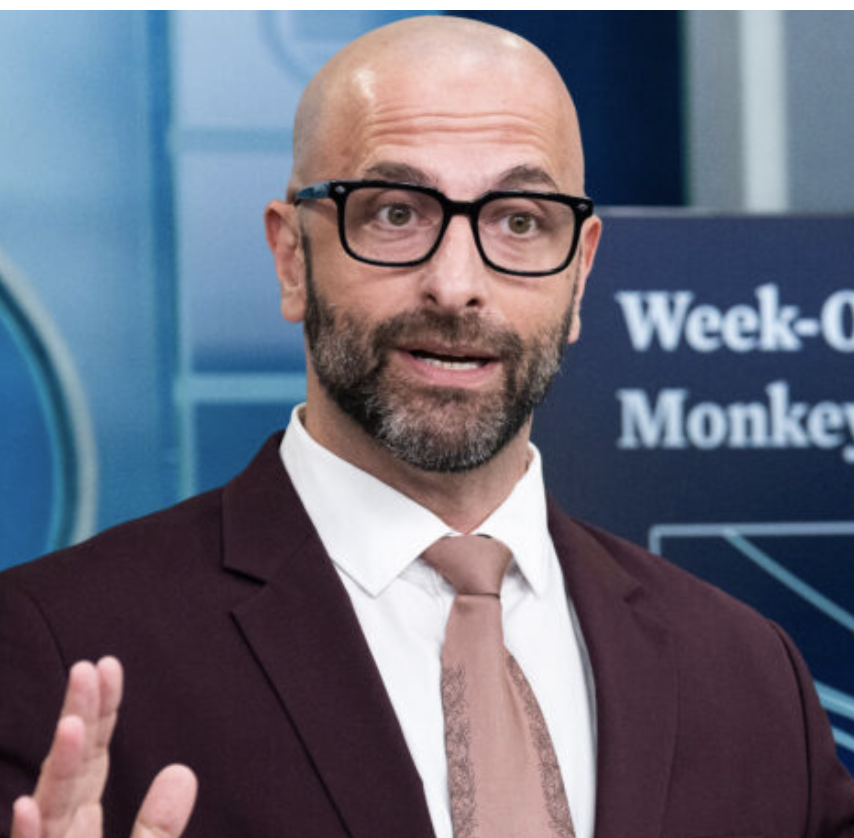The official President Joe Biden tapped to fight mpox—the virus formerly known as monkeypox—said public health officials should not oppose “Pride” events that end in anonymous same-sex orgies, but instead craft a policy that “supports” the “joy” victims find in random sexual encounters.

After all, “one person’s idea of risk is another person’s idea of a great festival or Friday night,” said the official, who frequently wears a pentagram in social media posts.
White House National Monkeypox Response Deputy Coordinator Dr. Demetre Daskalakis asserted that any message creating “stigma” for those who like to have sex with multiple strangers would actually increase mpox infections. Cases of the virus, which causes open sores and lesions on the skin, have risen nationwide as “Pride Month” rolls on.
“I always say that I’ve never made an HIV diagnosis in someone that hasn’t somehow related to stigma. I think mpox is the same,” Daskalakis told MSNBC host Jonathan Capehart on Sunday. Public health officials should “get the word out in a way that supports people’s joy as opposed to, you know, calling them risky.”
“One person’s idea of risk is another person’s idea of a great festival or Friday night, for that matter,” the Biden administration official said. “So, we have to sort of embrace that with joy and make sure that folks know how to keep themselves safe.”
“When you think ‘Pride,’ think joy and happiness,” Daskalakis told MSNBC, but also get “sexual health care lined up” to minimize transmission at mpox super-spreader events.
Monkeypox—which the World Health Organization renamed “mpox” last November to combat “racist and stigmatizing language”—has been on the rise, just one month after WHO Director-General Tedros Adhanom Ghebreyesus lifted its status as a global epidemic.
No one disputes that mpox occurs primarily among men who have sex with men, especially those who attend mass events such as “Pride Month” celebrations that may end in orgies. There are currently 30,487 mpox cases in the U.S., including 42 deaths, according to the Centers for Disease Control and Prevention.
In all, “95% of the cases in the U.S. have actually been among … gay, bisexual, men who have sex with men” means “this is the right population for us to focus on,” said Daskalakis. (You can watch Daskalakis’ full interview here.)
One-third of all people diagnosed with mpox reported having sex with five or more people in the past three weeks—as many sexual partners as the average American has in a lifetime. Yet Daskalakis said officials should talk about “the behaviors that potentially lead to mpox transmission without necessarily pinning them on one population.”
Far from stigmatizing or discouraging people from having sex with numerous strangers, Biden administration officials are “encouraging the orgies by giving out the vaccine at the scene,” Peter LaBarbera, founder and president of Americans for Truth About Homosexuality, told The Washington Stand. “Virtually every case of mpox is tied to homosexual or bisexual behavior tied to orgies. But they don’t ever say, ‘Don’t go to mass ‘Pride’ events that feature orgies.’ They say, ‘If you go to mass ‘Pride’ events ….’”
The last line of the CDC’s flyer on mpox spreading at “social gatherings” states only that “back rooms, saunas, sex clubs, or private and public sex parties where intimate, often anonymous sexual contact with multiple partners occurs, may (emphasis added) have a higher likelihood of spreading mpox.”
LaBarbera, a living encyclopedia of the LGBT movement, said the movement has blamed pandemic rates of sexually transmitted infections among men who have sex with men on “stigma” for decades. “When people see ‘stigma’ cited by the CDC, they should know that the pathology is rooted in high-risk and destructive LGBTQ behaviors themselves,” LaBarbera told The Washington Stand.
Public health officials blame victims for not receiving a “complete vaccine schedule.” But the CDC announced that 69% of the people infected in Chicago’s latest wave of mpox had been fully vaccinated with the Jynneos vaccine, administered since last August under a Food and Drug Administration emergency use authorization. “Two of the three cases in Colorado involve people fully vaccinated with two doses of Jynneos vaccine,” reported the Colorado Department of Public Health and Environment last week.
Rather than stigmatize anonymous homosexual sex, “we must address the systemic racism, sexism, homophobia, and transphobia that hamper our progress,” intoned Daskalakis in 2021. “This job is at its core an opportunity to dismantle stigma,” which he called a goal of his “entire career.” Likewise, Health and Human Services Secretary Xavier Becerra has declared that “reducing stigma associated with [the] disease is one critical step in our work.”
Still, Daskalakis has admitted the anonymity of LGBT sex has stymied his efforts to stop the spread. The Biden administration “focus[ed] on vaccinating people, people’s contacts,” he told former CNN host Don Lemon last August. But it “became clear that that wasn’t feasible, because not everyone knew who their contacts were.”
“Maybe it’s time to consider closing the bathhouses again, like they did with AIDS,” said LaBarbera.
Others shared his pique that the Biden administration does not wish to curtail kinky sex parties while clamping down on everyday life to fight other purported pandemics.
“It really is freaking outrageous that the [a]dministration that insisted we not go see our grandparents in the hospital during COVID doesn’t want to come between people’s ‘joy’ when they want anal orgies during monkeypox season, which they now call ‘mpox’ because of ‘stigma,’” wrote talk-show host Erick Erickson.
“If they want to declare a national emergency, maybe they need to do away with these apps like Grindr, maybe shut down the gay bars where a lot of this activity has been centered,” observed Family Research Council President Tony Perkins on “Washington Watch” last summer. “I mean, they closed the churches during COVID.”
Yet LGBT activists Chris Stedman and Aditya Chandorkar have argued that “calling for abstinence” among homosexuals is “not moral.”
Daskalakis has long emphasized curing the effects of promiscuous homosexual activity rather than discouraging sodomy. As far back as 2006, he injected LGBT-identified men with vaccines in gay bathhouses and sex clubs.
“We need to stop referring to sex as ‘risk behavior.’ And just embrace it as a normal part of the human experience,” Daskalakis, a board member of Gay Men’s Health Crisis (now restyled GMHC), told MetroSource in 2019. “People have sex for pleasure, and unless we embrace that, we aren’t going to be able to message strategies that help preserve and improve our population’s sexual health.”
He did not think HIV-positive men should be discouraged from having sex if they have low enough viral loads, as virus status creates a “serodivide” among people who identify as LGBT.
The Biden administration saw Daskalakis’ permissive view of homosexual activity as a positive job qualification, insiders say. “If anything, Daskalakis’ status as a proudly ‘out’ gay man was seen as an advantage in the administration’s effort to build credibility with the LGBTQ community,” reported Politico last September. “Unlike most public health officials, Daskalakis sees his thirst traps”—posting sexually provocative pictures of himself on social media—“as a part of his work, not separate from it.”
“I learned my bedside manner from East Village drag queens,” said Daskalakis, who practices the transgender lifestyle in his medical practice. Social media photos show him and the man to whom he is legally wed, fitness instructor Michael Macneal, cross-dressing. “HIV is a risqué disease, and I don’t really apologize for my lifestyle,” said Daskalakis defiantly.
“I get a thrill when people refer to me as a ‘Queer Health Warrior,’” he added.
Despite his engagement with LGBT activists, this summer’s sex-themed LGBT events plan to include fewer messages about the virus, revealed Dan Dimant, organizer of NYC Pride.
Daskalakis is frequently associated with satanic imagery. His “thirst traps” reveal a tattoo of a pentagram over his right pectoral muscle, near his heart, which he says reads, “I believe that there’s a light even in the darkest place.” He posed on the cover of Plus magazine—an LGBT-themed website that targets HIV-positive readers—in a leather halter with a pentagram inside a circle. Additionally, numerous photos from his timeline show him wearing the symbol, in one case making an apparent joke that the five-pointed figure could “unlock the gates of hell.”
“I am certainly not a satanist,” Daskalakis told The Advocate. He merely has a taste for “high fashion.”
Daskalakis, who grew up in the Greek Orthodox Church, also has a figure whom he identifies as Jesus tattooed on his stomach. The Greek Orthodox Church teaches having sex with members of the same sex is gravely immoral.
“[A]dultery, abortion, homosexuality and any form of abusive sexual behavior are considered immoral and inappropriate forms of behavior in and of themselves, and also because they attack the institution of marriage and the family,” according to a document on the Greek Orthodox Archdiocese of America’s website.
All Eastern Orthodox churches see same-sex activity as a grave sin. Acting on homosexual impulses “alienates us from God,” said a statement by all Assembly of Canonical Orthodox Bishops of North and Central America.
But Daskalakis told Politico if Americans object to his out-and-proud manner and use of satanic imagery, “I can’t give a f—.”
Originally published at WashingtonStand.com
